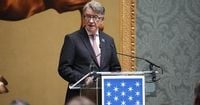Peter Mandelson’s dramatic fall from grace as the UK’s ambassador to the United States has sent shockwaves through Westminster and beyond, igniting a fierce political row and raising urgent questions about government vetting, accountability, and the delicate state of the UK-US relationship. The scandal, which erupted after newly uncovered emails revealed Mandelson’s continued support for convicted sex offender Jeffrey Epstein, has left Prime Minister Sir Keir Starmer’s administration scrambling to defend its judgment and transparency in the face of mounting criticism from across the political spectrum.
Mandelson, a Labour grandee known for his political acumen and international connections, was appointed to the high-profile Washington post earlier this year. According to Business Secretary Peter Kyle, Mandelson’s “singular talents” and experience were viewed as essential at a time when, as Kyle put it to the BBC’s Laura Kuenssberg, “global politics had been turned upside down” and the “relationship between Britain and America was in a perilous state because of the threat of tariffs, what was happening economically, trying to repurpose and rethink the special relationship.” Kyle insisted that Mandelson had helped “navigate the most difficult period in the US-UK relationship since the Second World War, and we have delivered for people in Britain time after time after time.”
Yet, even before his appointment, Mandelson’s longstanding association with Epstein was no secret. He had publicly apologized for the relationship, which included reports of him staying at one of Epstein’s properties even after the financier’s conviction for child sex offences. The Cabinet Office conducted an independent inquiry into Mandelson’s suitability, presenting its findings to the Prime Minister. As Kyle explained on Sky News, “both of these things turned up information that was already public and a decision was made that, based on Peter’s singular talents in this area, the risk of appointing knowing what was already public was worth the risk.”
However, the calculus changed abruptly on September 10, 2025, when Bloomberg published a cache of emails exchanged between Mandelson and Epstein. The emails, sent from an account long closed and previously inaccessible to vetting officials, included a message in which Mandelson urged Epstein to “fight for early release” as Epstein faced an 18-month prison sentence for soliciting prostitution from a minor in 2008. In another message, Mandelson reportedly wrote, “I think the world of you,” just before Epstein began his sentence.
The emails’ emergence set off a political firestorm. According to a Cabinet minister, Number 10 received “extracts” of the emails on Tuesday, September 9, and the Foreign Office immediately contacted Mandelson for his account and context. However, the full emails were not made available to the Prime Minister until Wednesday evening, after which Mandelson was withdrawn as ambassador the following morning, September 11, 2025. This timeline has become a focal point of opposition scrutiny, with critics alleging that Downing Street was slow to act and failed to disclose what it knew and when.
Conservative Party leader Kemi Badenoch was quick to accuse Prime Minister Starmer of “lying over what he knew,” insisting that he had “very serious questions to answer.” The Conservatives have demanded the immediate release of all documents related to Mandelson’s appointment, including vetting records, correspondence between the Foreign Office, Downing Street, and the British Embassy in Washington, and any communications involving key advisers such as Chief of Staff Morgan McSweeney. Shadow Chancellor Alex Burghart wrote directly to Starmer, asking whether he was aware of the emails before Prime Minister’s Questions on September 10 and if he had been briefed on their contents. “This scandal has exposed the Prime Minister’s appalling judgment. He ignored warnings about Peter Mandelson’s relationship with Jeffrey Epstein, forced through his appointment, and is avoiding scrutiny about what he knew,” Burghart charged.
The demand for transparency has grown louder, with the Conservatives pledging to use “every parliamentary mechanism” to compel the release of the so-called Mandelson/Epstein Files. Shadow education secretary Laura Trott echoed these calls, stating on the BBC, “We need these documents. We need to understand what advice went to the Prime Minister and when who made these decisions. How have we ended up in a situation where the advice for the Prime Minister is to appoint the best pal of a convicted paedophile to be US ambassador?” Dame Emily Thornberry, chair of Parliament’s Foreign Affairs Committee, has also demanded answers about the Foreign Office’s “developed vetting” process, underscoring the wider concerns about how such a high-stakes appointment could proceed despite clear warning signs.
Adding to the chorus of criticism, the family of Virginia Giuffre—one of Epstein’s most vocal accusers, who died in April 2025—spoke out against Mandelson’s appointment. In their first UK broadcast interview, Giuffre’s brother Sky Roberts declared, “Absolutely not. He should not have been given the position in the first place.” Amanda Roberts, Giuffre’s sister-in-law, was equally blunt: “Why does it take us to have to pull out the skeletons for people to be held accountable? Our governments have allowed these people to hold their status and their title without shame, and so part of me is like, we should have done something sooner. He should have never been given that title.”
Behind the scenes, the episode has also prompted renewed scrutiny of the ambassadorial vetting process itself. Former UK ambassador to the US Kim Darroch explained that such procedures “take weeks and weeks, if not longer,” and involve extensive background checks, including interviews with individuals not nominated as referees. “They do a thorough job,” Darroch said, but he acknowledged the limitations: “Emails from closed or old email addresses that have been closed down – I’m not enough of a technical expert to know how you get to that kind of thing, so whether that would have been available to them, I have no idea.”
For the government, the political fallout has been immediate and intense. With President Donald Trump’s state visit on the horizon and the UK’s international standing under the spotlight, critics argue that the scandal has left the Prime Minister “paralysed by scandal and incapable of leading our country,” as Burghart put it. While supporters point to Mandelson’s achievements in stabilizing the UK-US relationship during a turbulent period, the revelations have cast a long shadow over Downing Street’s judgment and the robustness of its vetting procedures.
As the calls for transparency and accountability grow, the government faces a pivotal moment. The Mandelson affair has exposed deep fissures not only in the political establishment but also in the processes meant to safeguard the integrity of public appointments. Whether Starmer’s administration can restore public trust—and whether the full truth of what was known and when will emerge—remains to be seen.


